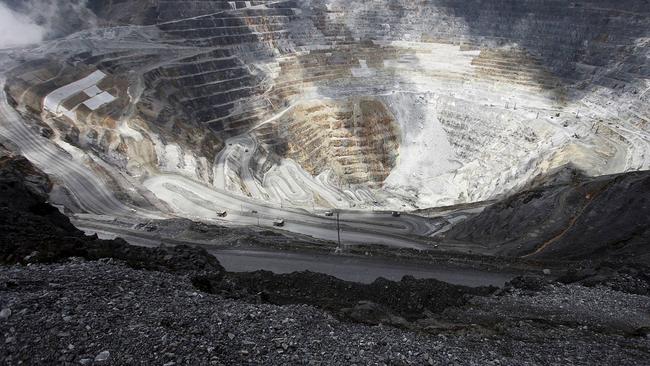Legal test case against Freeport Papua mine targets London Metal Exchange
The case seeks to build on a previous ruling that any product traded in the UK produced through forced labour in another country constitutes a proceed of crime.

Environmental critics of the world’s largest copper mine in Indonesia’s Papua region have launched a legal test case against the London Metal Exchange, warning it could be guilty of money laundering under British law by allowing products extracted from the mine to be traded on its platform.
The UK-based Global Legal Action Network and London Mining Network have demanded the LME, which bills itself as the “world’s centre for industrial metals trading”, disclose all knowledge or suspicion of environmental crimes at the Grasberg copper mine, for decades the subject of controversy for its impact on the environment and indigenous communities.
The two networks claim Grasberg is one of the few operations in the world permitted to use a “riverine tailings management system” to dump up to 200,000 tonnes of mining waste a day into the headwaters of the Ajkwa river delta – a practice that would be considered a serious environmental crime if committed in Britain.
Lawyers for the group say the fact the tailings system is occurring under permit in Indonesia is irrelevant under Britain’s Proceeds of Crime Act if the products derived from those practices are traded in the UK, as they are daily on the London exchange.
Harmful disposal of waste and unpermitted water discharge activity constitute environmental crimes in the UK punishable by up to five years’ imprisonment.
The legal action is the first time money laundering legislation under the act has attempted to be applied to environmental crime, and the first time a case of such scale has been brought against a financial institution.
GLAN lawyer Stephanie Calligara told The Australian the LME could be deemed in violation of criminal law if it did not disclose knowledge or suspicion that a product traded on its platform was derived from practices constituting a serious crime in Britain.
The exchange was also required to adopt “appropriate measures” to reduce the extent to which its facilities could be used for a purpose connected with financial crime, and to assist in detecting any such instances.
“The fact Grasberg mine has permits to operate the way it does from Indonesia has no relevance under UK law. What the mine does would be considered a criminal offence because riverine tailings dispersal is such a harmful practice that it has been banned almost worldwide except at Grasberg in Papua and in PNG,” Ms Calligara said.
“We suspect LME has not proceeded with the requisite disclosures and so wrote to them reminding them of their duty.
“We strongly believe the LME has a duty to ensure that no financial crime is committed through its platform. If Grasberg wants to keep trading on LME it will have to change the way it produces copper so hopefully this will benefit the communities effected by the mine.”
The aim of the action was to have all Grasberg products suspended or banned from being traded on the LME until its practices improved, she said.
Grasberg, also known as the Freeport mine, is jointly owned by the Indonesian government, Papuan provincial government and PT Freeport Indonesia, the mine’s operator and a subsidiary of the US-listed Freeport-McMoRan.
In a statement, Freeport dismissed the networks’ allegations against its tailings system as “baseless”, insisting it was “continuously monitored with routine oversight by third parties and has been effective in managing its impact on the environment and communities”.
“We are committed to responsible production by integrating globally recognised environmental standards and technologies. We continually strive to manage environmental risks, implement preventive and protective measures in our operations, and mitigate various impacts,” the statement read. “Proactive engagement with communities and integrating their input are fundamental principles in all our activities.”
Indigenous communities near the mine have complained for decades that the operations have caused harm to their health and livelihoods. A 2020 analysis of the mine’s tailings waste found it contained contaminants including arsenic, cadmium, lead, mercury and cyanide, while a 2016 study published in the journal Nature found the volume of waste was leading to “forest inundation and degradation of water bodies critical to indigenous peoples”.
Ms Calligara said the network had also written to Britain’s Financial Conduct Authority to request it investigate the LME.
The case builds on a previous legal ruling that any product traded in the UK produced through forced labour in another country constituted a proceed of crime, and should not enter the UK supply chain.
A spokesman for the London Metal Exchange said: “The LME takes its regulatory obligations seriously, and has appropriate measures in place to comply with such obligations, including in respect of POCA.”




To join the conversation, please log in. Don't have an account? Register
Join the conversation, you are commenting as Logout